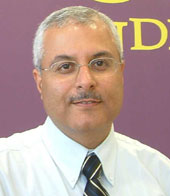 |
| Neville Taraporewalla Director and country general manager, Yahoo India |
A long jump athlete. A NCC cadet who represented Maharashtra. And a lover of hockey and cricket. In short, a sportsman. You’d expect to find him on the field. You are wrong, he’s hunched in front of a computer and heads one of the largest Internet businesses in the country. Meet Neville Taraporewalla, director and country general manager, Yahoo India.
But don’t discount his flair for sports. It may be this quality that helped him be fleet-footed. And he is still chalking up records. Taraporewalla did his schooling from Campion in Mumbai. Then came graduation from Elphinstone College and an administrative management degree from the Jamnalal Bajaj Institute of Management Studies, both in the same city.
He started his career with a little known entity called MediaScope in 1986. He joined The Times of India group’s Response in 1987-88. And right from day one, Taraporewalla liked what he did. “I was enamoured by the media. The Times of India introduced me to the world of advertisements and media planning.” In 1989, he joined Khaleej Times in Dubai as the international sales manager which took him to several European countries to acquire business.
In the process, he also managed to set up his own outfit. In 1991, Taraporewalla founded Ikon Media ? an international media representative company in the UAE. “My company represented some of the well-known media organisations like the Financial Times, The Times of India group and the South China Morning Post.” But home shores beckoned and he was back in India to set up the new media division at The Times of India, subsequently christened Times Interactive.
“It was a time when the Internet was just beginning to take root,” says Taraporewalla. “And my brief was just to take the print to the web.” Not only did Taraporewalla do what his bosses wanted him to, but he also managed to launch six web-based properties. In 1998, Taraporewalla spearheaded a team that conceived the idea of a web brand. And thus www.indiatimes.com was launched and he became the brandname for the new media division of the company.
In 2000, he had a stint with India Info before taking over as the chief operating officer of MidDay Multimedia, the group that publishes the largest-selling tabloid in Mumbai. Here again, he was involved with products like mid-day.com, MidDay Mobile and the call centre Hello MidDay before Yahoo happened.
“Little did I know that one day I would end up working for the company I was constantly benchmarking against for indigenously created products,” says Taraporewalla. He joined Yahoo India in May 2002, as the sales director and was later responsible for the overall sales and business. In 2003, he was appointed as the country manager. “The challenges were immense. The task was to make India a profit centre,” says Taraporewalla.
After restructuring management, focussing on key opportunities, and improving the service delivery, Taraporewalla managed to reverse the company’s fortunes. “Today, Yahoo India is growing at 100 per cent yearly and from just nine people we are now upto 100,” he says. The secret, he believes, lies in being a people’s manager.
“I cannot believe that you can succeed without a team,” he says. And it is for that reason he admires the founders of Yahoo ? David Filo and Jerry Yang. Says Taraporewalla: “Owners do not normally allow professionals to take on the business that easily. It requires a mindset to be a part of the winning team and not lead it.”
Does he miss working in different sectors? “I don’t regret having worked in different industries. In fact, the media landscape has been changing dramatically,” he states. “It keeps presenting challenges and that’s what has made me stay in the media.” He believes that the Internet as a medium is no different from the print and the TV media. Only the platform differs.
When not thinking internet, he loves movies and playing hockey and cricket with his son. He hopes to direct a movie some day. After all, it was Bollywood that first made Yahoo popular in this country.
As told to Aparna Harish in Calcutta










